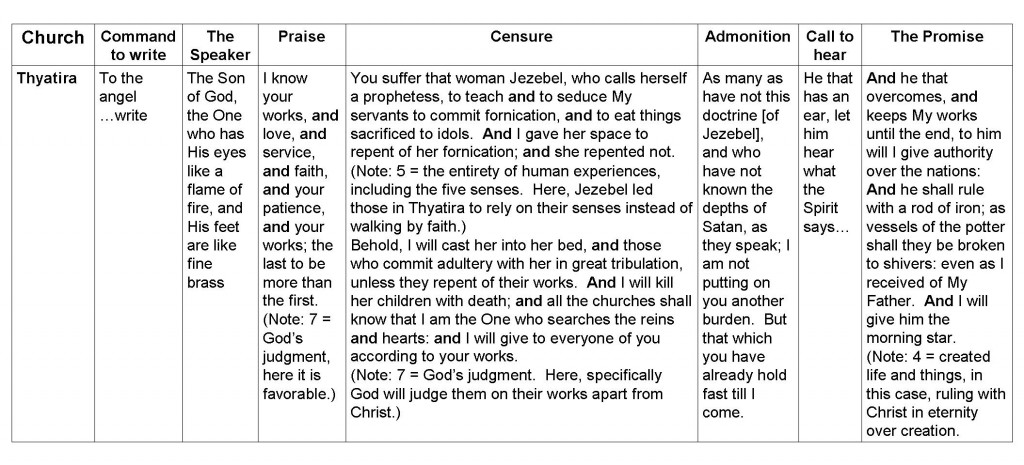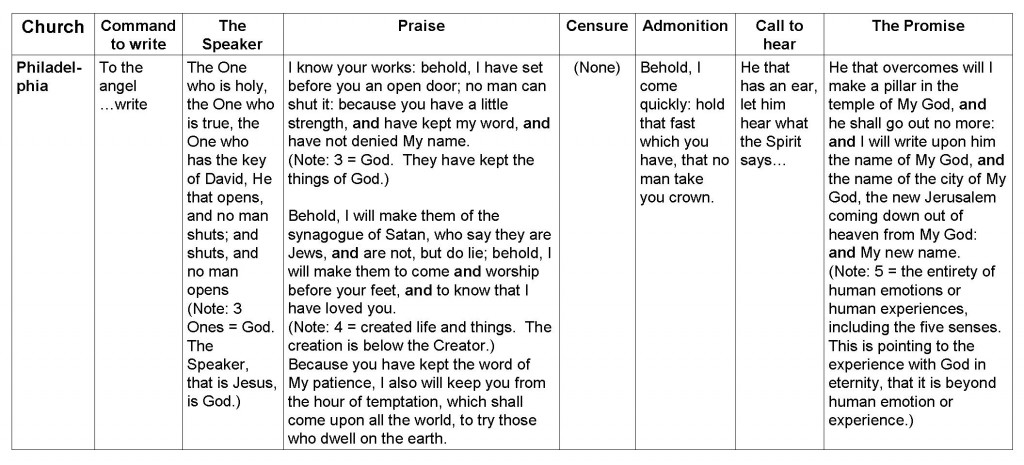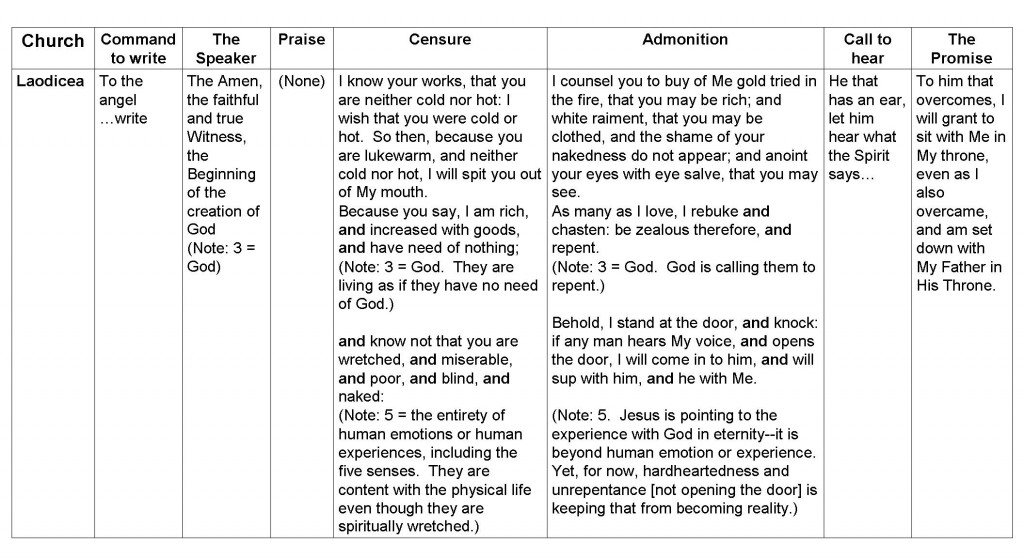 Chapters 2-3: The Seven Churches
Chapters 2-3: The Seven Churches
Now seeming to revel in the number 7, Jesus gives John a short letter to deliver to the “angel” of each of the seven congregations. But more than that, we have the seven letters organized into a seven-part pattern. This is seven on top of seven.
As we learned earlier, seven is the number for judgment, whether good or bad. And in these letters we see the judgment of God on each congregation—both good and bad!
Who are the “angels” of each congregation?
The Greek word for angel is angelos. We usually equate “angel” with a heavenly being. However, the word is not derived from who the
being is in his person but by what he does. And that makes sense, for an angel’s primary purpose is to be a messenger, to deliver a message from God. Being a heavenly being, in and of itself, does not make one an angel; it is being a messenger. (It just happens to be that most angels in the Bible are heavenly beings!)
So, here in Revelation, in chapters 2 and 3, John is delivering a message to real congregations in real cities. Therefore, the angel at each congregation has to be someone real who can read and deliver what John had written down.
– Who normally delivers God message to a congregation?
– Therefore, the angel in each congregation is the _____________.
Why seven congregations?
In Apostolic times, we know of eleven urban centers with Christians; yet, Jesus only told John to write to seven of them. We have already looked into the meaning of seven for judgment. It could also be that John, as the last living Apostle, was the Bishop overseeing those seven churches. And that makes sense, because the congregations were all accessible from Ephesus, where John lived and served when not exiled on Patmos.
Seven congregations also give enough breadth, collectively, for them to represent the strengths and weakness of all congregations of every age. The Muratorian Canon (an ancient list of canonical books in the late 2nd century) states, “John, too, indeed, in the Apocalypse, although he writes only to seven churches, yet addresses all.” And that is how we should receive what John delivers to the seven churches—not as words only for “them,” but also for us.
Nicolatians: A short-lived sect that made comfortable compromises with the world. They rejected, what seemed to them, the false rigor of Christian orthodoxy. They were know for being lax, allowed eating food sacrificed to idols, and made peace with the rampant immorality of their day (2:14, 20-21).
Antipas: Pergamum was a place where the Roman religions thrived. There, the first temple was built solely for the purpose of worshiping the Emperor. Refusing to worship Caesar was a crime of treason. So, he was someone martyred who refused to do that.
Balaam: Balak, a pagan king, hired Balaam to curse the Israelites, so he could defeat them in battle. When that failed, Balaam allied himself with the Midianites and induced Israel to accept a hybrid form of pagan-true God worship (syncretism). This led the Israelites into sexual sins (Numbers 25:1-9, 31:15-16).
Hidden Manna and White Stone: The hidden manna is the Lord’s Supper. It’s hidden because you can’t see what you receive: Jesus’ body and blood. That was contrasted against the eating of food sacrificed to idols, which the Christians in Pergamos were doing. The white stone hails refers to the custom of showing a little, white stone, with some appropriate mark on it, to gain entrance to a feast or banquet. The new name written on the stone refers to baptism, when the one baptized was baptized into the name of the Father and of the Son and of the Holy Spirit. And so the Christians in Pergamos were told to live faithfully in one’s baptism and receive the Lords’ Supper, not eat pagan meals, looking forward to the marriage feast of the Lamb in eternity.
Prophetess Jezebel: Jezebel, the wife of King Ahab, was an Old Testament Queen who warred against Elijah and God’s true prophets (1 Kings 16:31, 19:1-2). Because this prophetess also warred against the truth of God, by solving the “Christ vs. culture” problem the Christians there faced, she was named Jezebel. Her teachings led those in Thyatira to eat food sacrificed to idols and practice fornication. Some early, Greek manuscripts, say that Jezebel was the wife of the “angel,” the pastor, at Thyatira.
Morning Star: In Revelation 22:16, Jesus calls Himself, “the Bright, Morning Star.” 2 Peter 1:19 refers to the Word of Jesus as being “the morning star that rises in your hearts.” Morning Star is then referring to spending eternity in Jesus’ presence; it is pointing to the dawn of eternal resurrection for the believer.
Seven Spirits: Most likely referring to the Holy Spirit, with seven representing the seven-fold description of the Spirit in Isaiah 11:2:
- The Spirit of the Lord,
- the Spirit of wisdom
- and understanding,
- the Spirit of counsel
- and power,
- the Spirit of knowledge
- and fear of the Lord.
Seven Stars: Revelation 1:20 earlier identified these spirits as the seven angels, messengers, at the seven congregations to whom John is writing.
White Raiment/Garments: Symbolize the blood and righteousness of Christ, which cover all who repent, are baptized, and believe. Those who have been baptized have been clothed with Christ (Galatians 3:27), washed clean with the water and the Word (Ephesians 5:26, the washing of rebirth and renewal (Titus 3:5), which saved because of because of Christ’s death and resurrection (1 Peter 3:18-22).
Book of Life: In Exodus 32:32, Moses begged God either to forgive His people’s sins or to remove his (that is, Moses’ name) from the Book of Life. The Apostle Paul mentioned the Book of Life in Philippians 4:3. To have your name removed from the book of life means death, eternal death. Here, Jesus is saying that the one who remains in the faith will not have his name blotted out from the Book of Life, that is, he will spend eternity with God.
Key of David: Isaiah 22:22 mentions the “key of David.” That’s when Eliakim replaced Shebna as the Prime Minister of the Davidic Kingdom. There, the “key” of the kingdom symbolized the authority of the Davidic king given to the Prime Minister, who acted with the King’s authority: “what he opens no one can shut, and what he shuts no one can open” (Isaiah 22:22). The Prime Minister admitted or excluded others from the King’s presence. In Revelation, the One who has the key of David is Jesus, who has been given “all authority in heaven and on earth” (Matthew 28:18).
Jesus has what they need:
- They are wretched and miserable and poor; Jesus has gold tried with fire.
- They are blind; Jesus has eye salve.
- They are naked; Jesus has white raiment/garments.
– To whom is Jesus speaking when he says, “Behold, I stand at the door and knock: if any man hears My voice, and opens the door, I will come in to him and will sup with him, and he with me”? Is it Christians in need of repentance or non-Christians?
– Does this verse support the theology of a non-Christian “asking Jesus into his heart” to be saved?








